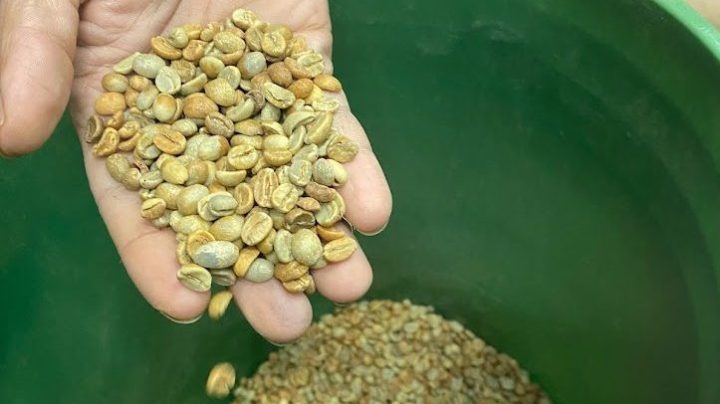
For 50 years, the price of coffee has barely budged. Some farmers have had enough.
For 50 years, the price of coffee has barely budged. Some farmers have had enough.

Coffee consumption in the U.S. is at an all-time high, with two-thirds of us drinking coffee every day. And from land to labor, the price we pay for beans doesn’t account for everything that goes into growing coffee. Plus, with climate change increasing drought and disease, farming is becoming an even riskier financial endeavor. But for more than 50 years, the price of unroasted green coffee on the commodities market has averaged less than $2 a pound.
“There’s a lot of work in terms of processing and picking and harvesting and growing the coffee,” said Matt Lounsbury, senior vice president at Proud Mary Coffee Roasters. “All the while the price has either stayed flat or by today’s dollar standards it’s gone down.”
He said it’s why the future for coffee producers is grim. “It sucks. They can’t get the right price for their coffee, and none of the kids want to inherit the farms. There’s no money in it.”
And when there’s no money in it, coffee farmers don’t want to keep farming.
“I’ve heard so many producers say, ‘Hey, I sold my farm,’” said Emi-Beth Aku Quantson, a coffee roaster and CEO of Kawa Moka Coffee Co. in Ghana.
One challenge for farmers is that coffee is on the global commodities market, which sets a generic price for it. There’s no consideration of where it’s grown or how much labor goes into a particular crop. It’s called the C price, and Aku Quantson said that’s what most coffee buyers reference.

“Sometimes people hide around, ‘Oh, this is a C price and therefore that’s what we can pay for it,’” she said. “But there’s nothing that’s stopping you from putting a value to the coffee that can keep the producer in coffee.”
The commodities market is based on supply and demand, but it requires coffee to be traded in bulk — 37,500 pounds per lot. And that bulk pricing model doesn’t really fit with how coffee is grown.
“Small holders don’t have bulk. Small holders produce small volumes,” said development economist Vera Espíndola Rafael.
According to Espíndola Rafael, up to 90% of all coffee comes from small farms, many smaller than five acres. And she said coffee roasters are key because they can choose to bypass the C price.
“It’s not a law you have to obey, it’s a reference tool,” she said. “So, you can decide yes or no to use it.”
It’s why Espíndola Rafael helped create the Sustainable Coffee Buyers Guide. Companies buying coffee can input the price they pay for raw beans and the tool calculates that price into one of four tiers related to the livelihood of producers: poverty price, legal price, living price and prosperous price. It’s a way to help coffee buyers truly understand the cost breakdown and also to encourage a shift in buyers’ minds.
“People still say it’s hard to convince buyers,” Espíndola Rafael said. “You’re damn straight it’s hard. And you know what’s also hard? The poverty that these producers are living in.”
There’s a lot happening in the world. Through it all, Marketplace is here for you.
You rely on Marketplace to break down the world’s events and tell you how it affects you in a fact-based, approachable way. We rely on your financial support to keep making that possible.
Your donation today powers the independent journalism that you rely on. For just $5/month, you can help sustain Marketplace so we can keep reporting on the things that matter to you.

















